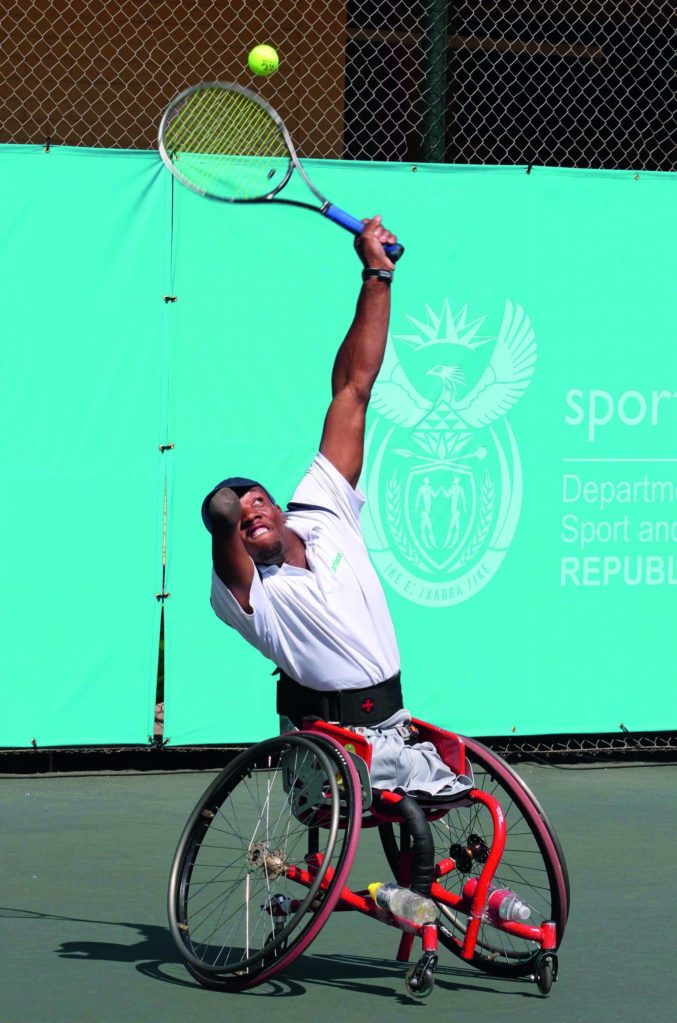The room went quiet and all that could be heard was the sobbing of an emotional young man. His crying was soon drowned out as the small crowd of fans and media rose to their feet and began applauding. He had just reached the pinnacle of disabled tennis with a win in the US Open quadriplegic wheelchair tennis division a few days prior, beating the world number one in the final. Lucas Sithole was not ready for the media circus which followed. He simply had never dreamt of this moment.

Back in 1998, 12-year-old Sithole, without much direction in life, found new meaning following a tragic accident in Dunhouser, KwaZulu-Natal, South Africa.
Helping load goods onto a train with a friend, Lucas was caught underneath the wheels of the train when it started moving and his body was shredded to pieces. What remained was his left arm, but most of his right arm and both his legs were gone. For Lucas, it was if the world he knew was destroyed in an instant. Depression washed over him and for a while there was no end to his nightmare. The glimmer of hope appeared later when he turned to disabled sport.
At first, Sithole did not know which sport to take up and he started with athletics. When he moved to Pretoria in 2005 to complete his schooling, he switched to wheelchair tennis. He excelled in the discipline.
Loading...
By 2011, he had risen to the top-ranked player in South Africa. Even then, Sithole was abundantly clear about what tennis had done for his life.
“Tennis gives me a reason to live,” said Sithole in April 2011, when he was already ranked 14th in the world.
“Tennis is an individual sport, and I don’t like playing team sports. Tennis is life, and it gives me life. It all started when I accepted myself after my accident. I didn’t stay indoors, I went to look for help and my primary school was a big help.”
The approach he takes, the humble man admits, is a mental one. It is about never looking back, staying in the moment and planning for the future.
Watching Sithole move around the court with ease in his wheelchair is a sight to behold. Throwing the ball up while holding the racket, both with his left hand, he boasts a powerful serve. But, it is the way he moves around using the stump of his right arm to turn the wheel of his chair and then his left hand which helps produce his speed.
His conduct on the court has also drawn much praise and he is idolized in the disabled community. On his return to South Africa, he was greeted by large crowds of disabled school pupils all hurrying to get an autograph from the first African to win a title at the US Open.
When asked where his inspiration comes from, Sithole says his coach.
“In wheelchair tennis my role model is my coach Holger Losch.”
Losch was a regular tennis coach and had to make the adjustment to quad tennis, but the partnership has grown in strength since they joined forces.
He too, was not short of praise for his star player.
“We are really proud of him for his win and the way he behaved,” says Losch.
Now, Sithole—having risen to number two in the world in the quad division after his win in the final over the number-one-ranked David Wagner—is readjusting his goals. Having competed in his first Paralympics in London in 2012, his major goal will be to win a medal at the 2016 edition in Rio de Janeiro.
In the meantime, Losch says he hopes the success of Sithole will inspire many more disabled athletes in South Africa and in particular the already growing sport of wheelchair tennis.
“Nine years ago, there were about three players playing wheelchair tennis in South Africa. Now there are about 500 children playing wheelchair tennis every week. We host six tournaments in [the country] on an annual basis and that’s just great for the game.”
Meanwhile, Hendrietta Bogopane-Zulu, the deputy minister of disabled people, says Sithole’s success in the sport will give hope to the entire disabled population of the Rainbow Nation.
“From Newcastle [KwaZulu-Natal] to New York that’s quite a journey for Lucas. When people with special needs are recognized they can achieve anything.”
Bogopane-Zulu says the possibilities are endless now that Sithole has announced himself on the world stage with his major win.
“March on and give disabled people a chance. We need to recognize the rights of the disabled to give them the belief to achieve. We need people to invest in wheelchair tennis so we can produce more Lucas Sitholes.”
Even the sport’s national governing body, Tennis South Africa (TSA), were quick to congratulate Sithole, with the president Bongani Zondi heaping praise on the 27 year old.
“We are proud as TSA to have a champion at long last and also a black South African. We are proud of Holger and all the work Wheelchair Tennis South Africa are doing.”
Sithole was a student at Philadelphia Secondary School. Thirteen-year-old Neliswe attends the same school says she wants to be just like the tennis star. For the young girl, who was born without legs, the chance to rub shoulders with one of her idols is an experience she says she will never forget.
Following on from his title at the US Open, Sithole reached the final of the Australian Open in January. Despite winning the first set, the South African could not hold Wagner off in the final two.
Whether or not Sithole goes on to win more big events, it is quite clear to see that he has already accomplished his mission.
Loading...
